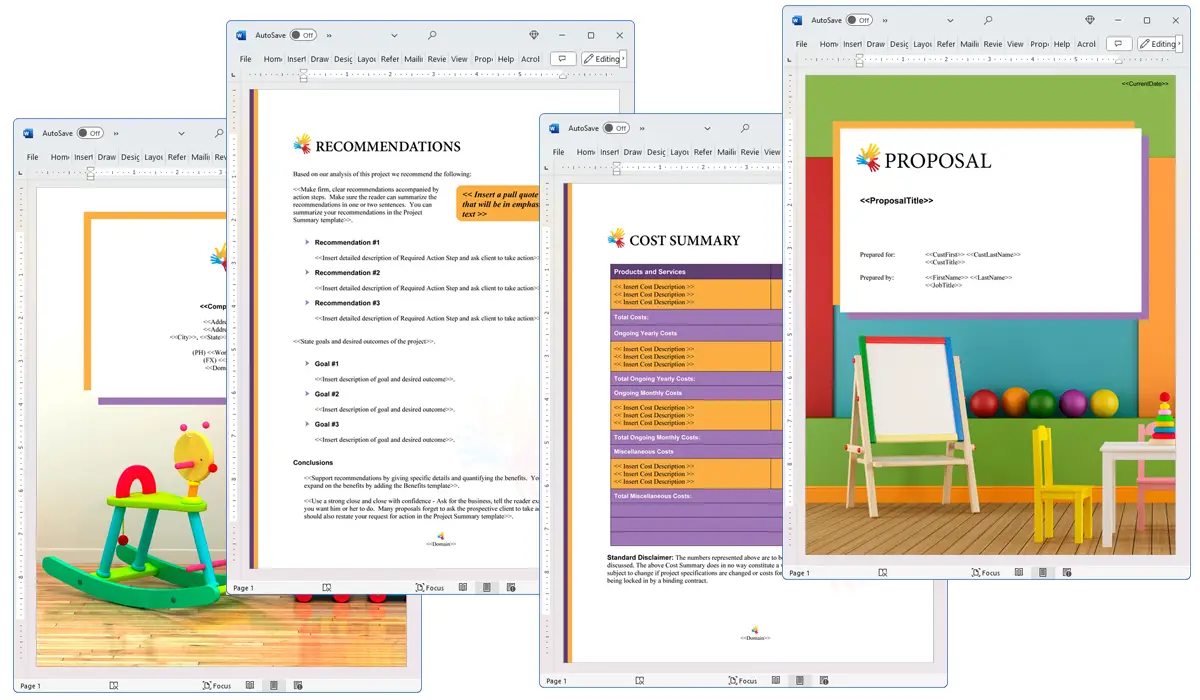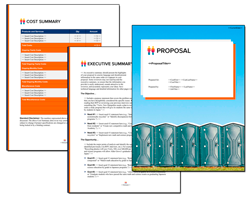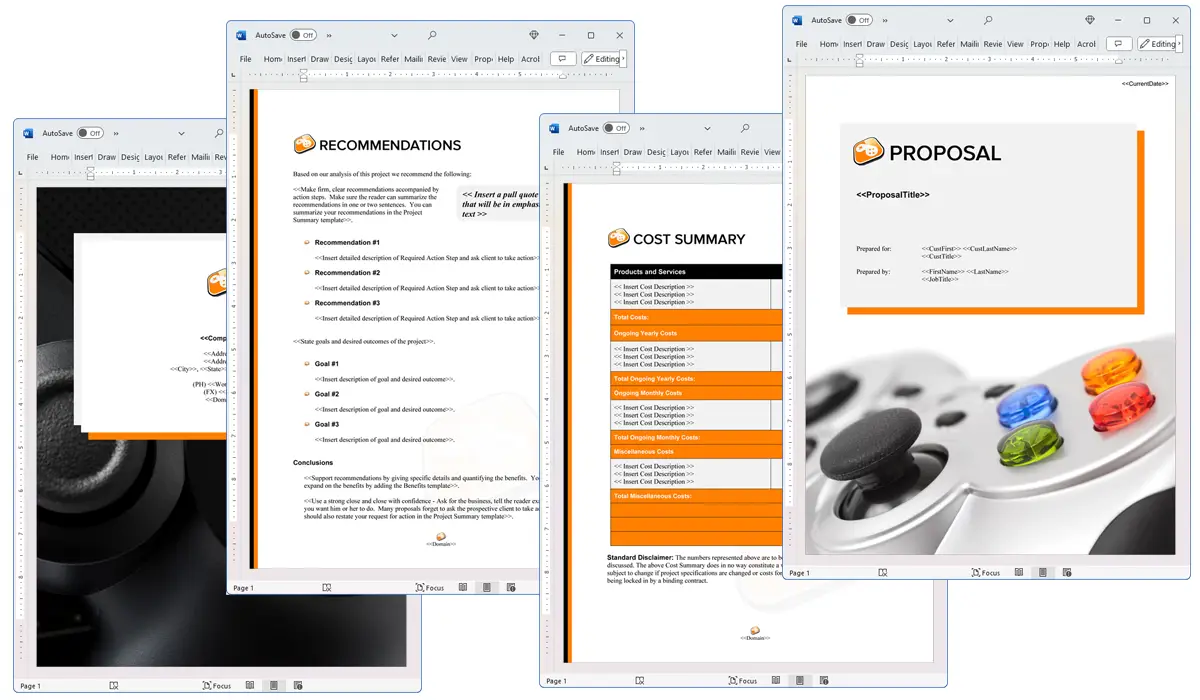What is the Internal Requirements chapter used for?
Proposal Kit Professional Bundle adds more design themes, all six Contract Packs,
a project management library, and Expert Edition software.

Illustration of Proposal Pack Children #4
We include this Internal Requirements chapter template in every Proposal Pack, along with thousands more. You assemble this chapter with others in various combinations to create custom-tailored business proposals, plans, reports, and other documents. Proposal Packs apply custom visual designs to the templates, giving the final documents a consistent professional finish.
 DOWNLOADABLE, ONE-TIME COST, NO SUBSCRIPTION FEES
DOWNLOADABLE, ONE-TIME COST, NO SUBSCRIPTION FEES
Overview of the Internal Requirements Chapter
The Internal Requirements chapter is an important part of a business proposal, particularly when the proposal involves complex projects that require detailed internal coordination and resource planning. This chapter serves as a foundational element that helps businesses articulate the specific conditions, resources, and standards that must be met internally to successfully carry out a project. By clearly outlining these internal requisites, companies can ensure that all team members are on the same page and that the project aligns with the organization's capabilities and objectives.
How is the Internal Requirements Chapter Used?
When used in a business proposal, the Internal Requirements chapter is used to communicate the important internal elements needed for project execution. This includes detailing the personnel, technologies, and processes that the company must arrange internally before initiating the project. It helps in setting the groundwork for project planning and management, ensuring that the resources and systems are aligned with the project's goals. This chapter is particularly useful for clarifying to all stakeholders involved what the business needs to provide from within to make the project feasible and successful.
What is Included in the Internal Requirements Chapter?
Typically, the Internal Requirements chapter includes:
- Resource Allocation: Describes the types and amounts of resources (both human and material) that are necessary for the project.
- Internal Processes: Outlines any specific procedures or operations that must be followed or established internally to support the project.
- Compliance and Standards: Details any internal compliance issues or standards that need to be met during the project.
- Risk Management: Identifies potential internal risks and the strategies to mitigate them.
- Budget Constraints: Discusses the financial aspects that must be considered and managed within the project framework.
Use Case Examples for the Internal Requirements Chapter
The Internal Requirements chapter can be adapted for various situations across different industries. Here are a few examples:
- In a proposal for a new software development project, outlining the specific programming skills and technology infrastructure required internally.
- For a manufacturing project, detailing the internal quality control processes that must be in place.
- In a healthcare services proposal, specifying the internal staffing qualifications and certifications required.
- When proposing a marketing campaign, clarifying the roles of internal departments such as creative teams and media planners.
- For an educational initiative, listing the internal support services like tutoring or technological aids that will be needed.
Key Takeaways
- The Internal Requirements chapter is important for defining the internal resources and conditions necessary for a project.
- It ensures all stakeholders understand the internal capabilities and preparations required.
- The chapter includes information on resources, processes, compliance, risk management, and budgeting.
- It is adaptable to various industries and can be customized according to the specific needs of a project.
- Clearly articulating internal requirements helps in aligning project objectives with available internal resources and capabilities.

Illustration of Proposal Pack Sanitation #2
 What Our Clients Say
What Our Clients SayProposal Kit’s templates and formats helped us rework our own proposals to make them both look more professional, and make them easier to write. Definitely a must use product to streamline the proposal process."
CorpSolv Inc.
 4.7 stars, based on 845 reviews
4.7 stars, based on 845 reviewsAlternate Chapters
Related Chapters

The Internal Requirements chapter and other chapters are integrated into a Word document as illustrated here in the Proposal Pack Computers #7 design theme. There are hundreds of design themes available, and every design theme includes the Internal Requirements chapter template.
A proper business proposal will include multiple chapters. This chapter is just one of many you can build into your proposal. We include the complete fill-in-the-blank template in our Proposal Pack template collections. We also include a library of sample proposals illustrating how companies in different industries, both large and small, have written proposals using our Proposal Packs. This template will show you how to write the Internal Requirements.
We include a chapter library for you to build from based on your needs. All proposals are different and have different needs and goals. Pick the chapters from our collection and organize them as needed for your proposal.
Using the Proposal Pack template library, you can create any business proposal, report, study, plan, or document.
 Ian Lauder has been helping businesses write their proposals and contracts for two decades. Ian is the owner and founder of Proposal Kit, one of the original sources of business proposal and contract software products started in 1997.
Ian Lauder has been helping businesses write their proposals and contracts for two decades. Ian is the owner and founder of Proposal Kit, one of the original sources of business proposal and contract software products started in 1997.By Ian Lauder
 Published by Proposal Kit, Inc.
Published by Proposal Kit, Inc.


 Cart
Cart
 Facebook
Facebook YouTube
YouTube X
X Search Site
Search Site